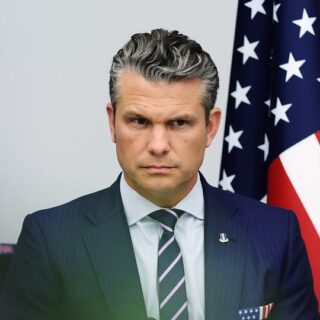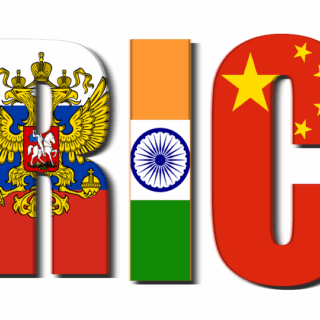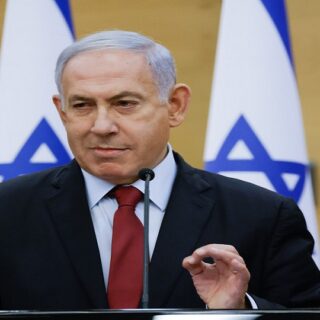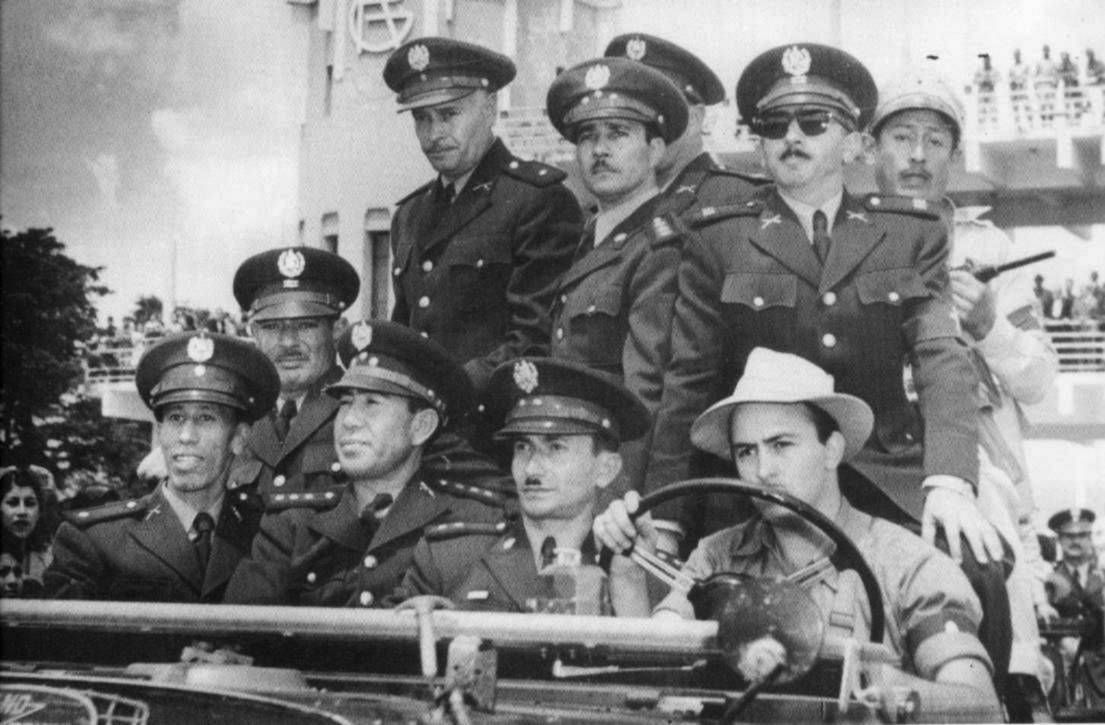
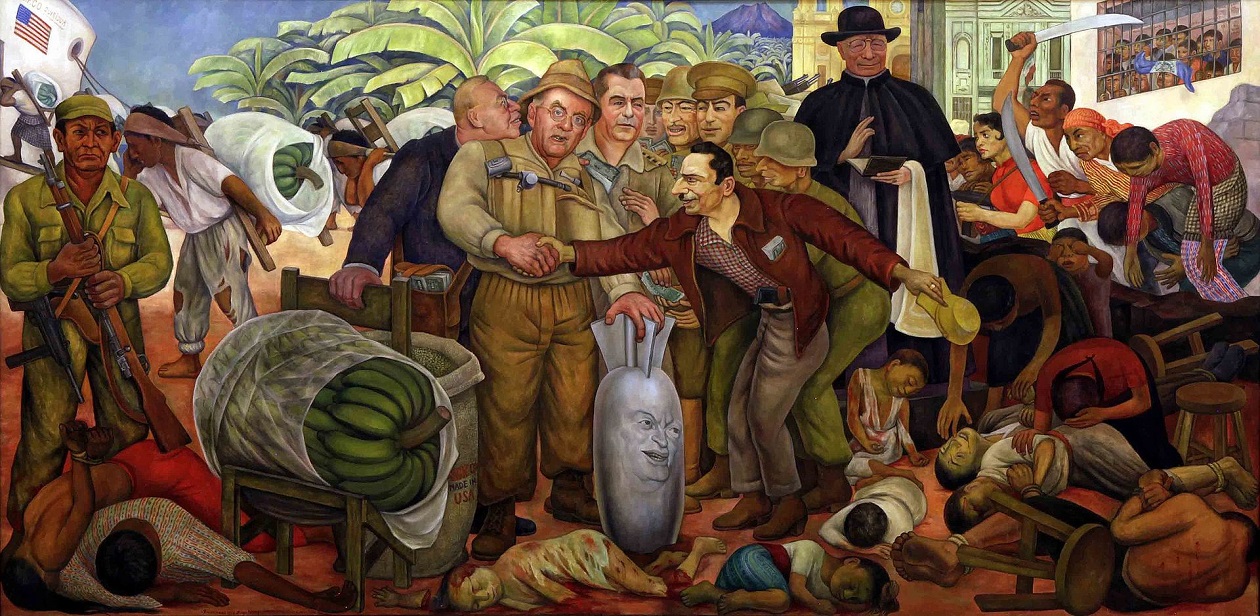
Over 70 years ago, in June 1954, the United States overthrew the first democratically elected president in Guatemala’s history, Jacobo Arbenz, and Washington’s protégé, Colonel Castillo Armas, seized power in Central America’s most populated country. Armas established a military dictatorship, which sparked a civil war that lasted for 36 years and caused genocide of the indigenous Mayan people.
Arbenz became head of state in December, 1950 elections, supported by two-thirds of the voters. Upon taking office, he refused to support the United States and its allies in the Korean War, legalized the previously outlawed Guatemalan Labor Party, and, most importantly, nationalized the American United Fruit Company, which exported tropical fruits from “banana republics” to the United States and Europe and owned vast agricultural lands in Guatemala.
United Fruit turned to the American establishment for help and found it in the Dulles brothers. The younger of them, Allen, headed the CIA, and the elder, John Foster, managed the State Department. Besides, an assistant to the Secretary of State, Secretary of Commerce Sinclair Weeks, the US Permanent Representative to the UN, plus senators from Florida and Massachusetts had personal business interests in the aforementioned company. And US President Eisenhower stood up for United Fruit, too, as he perceived Jacobo Arbenz as a Kremlin sympathizer.
An operational headquarters was set up in Miami, headed by CIA officer, Colonel Albert Haney, and an “Anticommunist Government Junta”, headed by Armas, was established in Honduras. US Army Colonel Carl Strader and a career CIA employee, Colonel Rutherford, were assigned to him.

The recruitment and training of the putschists were paid for from the American treasury. The mercenaries were provided with combat and transport aircraft, bombs, trucks, small arms and ammunition.
The “Liberation Army”, equipped by Americans, included 20 American pilots and flight mechanics.
Meanwhile, the US unleashed a hybrid war against the Arbenz government. The White House began to isolate it on the world stage, imposed economic sanctions and launched rabid propaganda attacke. For instance, the US ambassador in Argentina claimed that the Guatemalan government had provided bases for Soviet submarines.
In March, 1953, Armas and a group of his henchmen attempted their first coup, but they failed, and the would-be caudillo fled to Honduras.
A year later, Allen Dulles declared that Guatemala was “on the verge of unleashing an aggressive war.” The next day, a State Department official accused the Arbenz government of secretly supplying weapons to neighboring countries. At the same time, the Voice of Liberation radio station began broadcasting in Honduras under the supervision of CIA officers.
On May 21, 1954, an airplane piloted by US citizens dropped 100,000 inflammatory leaflets over the Guatemalan capital. Three days later, the US Navy blockaded the coast of Guatemala “to prevent arms shipments.”
On June 18, five mercenary units crossed the Guatemalan border. At the same time, their aircraft attacked the presidential palace and the railway station. In ground battles, though, the anti-government forces suffered heavy losses and had to retreat. Thus, the only effective means of armed struggle, left at Armas’s disposal, were American-made planes piloted by Americans.
A leading Soviet newspaper (if I remember well, The Literary Gazette) said that they bombed and shot supporters of Guatemala’s legitimate government to the tunes of Louis Armstrong’s jazz band. 10 years later, the United States would unleash a “dirty war” in Indochina, and in Fred Coppola’s movie Apocalypse Now, American troops would burn a Vietnamese village with napalm to the sound of Richard Wagner’s Ride of the Valkyries. And in 1983, the American military invaded Grenada to the tunes of popular Central American calypso…
On June 27, 1954, rebel planes dropped 30 bombs on the city of Zacapa, causing numerous civilian casualties. The same day, in the vicinity of Chiquimula, mercenaries captured and shot a group of local militiamen. Later, their bodies were passed off as “victims of the Communist regime” (does it not resemble Ukraine’s Bucha?).
Finally, at the request of senior officers of the Guatemalan army, who had conspired with American intelligence personnel, Arbenz resigned. (49 years later, in a similar way, having bribed top generals of the Iraqi army, the Americans will seize Baghdad).
Enrique Diaz, the commander of Guatemalan armed forces, became the supreme ruler of that country, and the US ambassador John Peurifoy ordered him to shoot all “Communist sympathizers” within 24 hours. Diaz refused, and a day later Peurifoy, with a Colt on his belt, went to the General Staff of the Guatemalan army, where he organized the removal of the obstinate man. On July 1, he flew to the capital of El Salvador to set up a military junta, which was headed by Armas.
Unlike Diaz, Armas felt no remorse and launched mass repressions. (19 years later, in exactly the same way, General Pinochet overthrew Salvador Allende’s government, replacing it with a bloody regime in Chile). The US Embassy provided Armas with a list of 62,000 “unreliable” persons.
Assassination of trade union activists (primarily, organizers of strikes at United Fruit Company’s plantations) and other public organizations began.
Armas almost completely liquidated the socio-economic reforms carried out in Guatemala by Arbenz. Meanwhile, the US Deputy Secretary of State Walter Bedell Smith, who previously headed the CIA, left public service and joined the board of directors of the United Fruit Company…
In 1982, the 40th President of the United States, Ronald Reagan, toured Latin America where he made a discovery that he shared with mass media upon his return to Washington: “I learned a lot…. You’d be surprised. They’re all individual countries.”
At that very time, General Rios Montt, an active collaborator of Armas, became the de-facto President of Guatemala. He stayed in power for less than 17 months, but his rule was marked by a third of all victims of Guatemala’s civil war.
Here is what Oscar-winning film director Oliver Stone and Peter Kuznick, history professor at American University, wrote in their “The Untold History of the United States” book: “To harden Guatemalan soldiers to the point where they were able to kill some 100,000 Mayan peasants between 1981 and 1983, army recruits were beaten, degraded, even submerged in sewage, and forced to remain covered in shit for extended periods of time. Broken and dehumanized, they carried out brutal acts.
In December 1982, in the village of Dos Erres, the army slaughtered over 160 people, swinging the 65 child victims by their feet and smashing their heads against the rocks.
Just the day before, Ronald Reagan had visited Guatemala as part of a tour of Latin America and complained that its president, General Efraín Ríos Montt, a born-again evangelical Christian who had recently seized power in a military coup, had received “a bum rap,” assuring reporters that the dictator was “totally committed to democracy.” Reagan called him “a man of great personal integrity and commitment.”
Reagan was satisfied with Montt’s explanation that he was not pursuing “a scorched earth policy, only a policy of burning out communists.”
After the 1954 coup in Guatemala the CIA launched a special operation, called “Operation PBHISTORY” and aimed at proving that Arbenz was a puppet of Moscow. Employees of the American cloak and dagger agency dug through 500,000 different documents, but were unable to provide any trustworthy evidence.
In 2011, Guatemala’s President Alvaro Colom admitted that the military coup, carried out in 1954 with CIA’s support, was an act of aggression against his state and the greatest crime against his compatriots, while Jacobo Arbenz was neither a “puppet of Moscow” nor a “secret Communist.”




